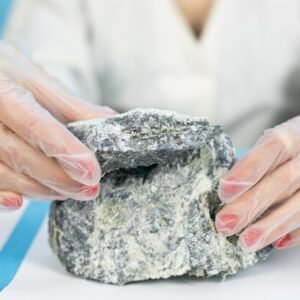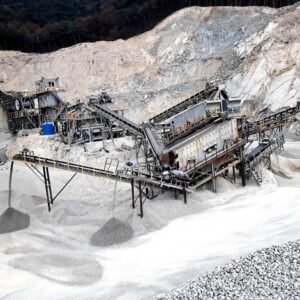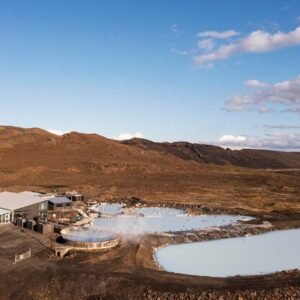Found by Ford Benton in the US, CMS-grade Bentonite is an eco-friendly drilling fluid in HDD. But, what is Horizontal Directional Drilling (HDD)? It is an effective method (popular in recent years) to install underground utilities without disturbing the balance of the earth’s surface.
The success of this process depends on various drilling fluids and the most important one being Bentonite. It helps in various ways like stabilizing boreholes, lubricating drill bits, and removing drill cuttings.
Today, we will explore everything about Beronite and its use in HDD.
What is Bentonite
Bentonite, a type of clay that occurs naturally from the erosion of ash derives its name from Fort Benton, Wyoming in the US where it was initially found. This clay stands out for its ability to absorb water and expand to times its original size. These qualities make it a valuable material, for uses including in drilling operations.
The main component of bentonite is montmorillonite, which belongs to the family of clay minerals. The plate-like structure at a level gives bentonite its characteristics like a large surface area, high swelling capacity, and low permeability. These attributes enable bentonite to serve purposes in drilling fluids and play a role, in HDD projects.
Types of Bentonite
There are two main types of bentonite used in HDD drilling fluids: sodium and calcium bentonite. They differ from one another in their own patterns of behaviours which eventually lead to their distinctive attributes being manifested.
Sodium Bentonite:
- Sodium bentonite is the most frequently used type of the drilling additive in HDD processes.
- It has a higher swelling capability than implied calcium bentonite; that is, its water absorption capacity is stronger, and it has more deflection force.
- Mixing water with sodium bentonite turns it into a gel-like substance that ensures upward movement and removal of the drill cuttings from the formation.
- The other function is that is able to filter fluids and gravitate them back which in turn prevent fluid loss and maintain borehole stability.
Calcium Bentonite:
- Calcium bentonite is rarely used in drilling muds for HDD; however, it may deliver an advantageous function in certain cases.
- It has lower swelling capacity but shows high-temperature and salt-contamination resistance.
- Calcium bentonite can be used with hard water or together with other additives to improve overall liquid impetus.
Physical and Chemical Properties of Bentonite
Bentonite has unique physical and chemical properties that make it a suitable option for HDD drilling. Bentonite mainly consists of montmorillonite, which’s a form of clay mineral. Some of the qualities include;
- High swelling capacity
- High surface area
- Low permeability
- Thixotropic behavior
- Cation exchange capacity
The Role of Bentonite in HDD Drilling Fluids
Bentonite plays a role, in the formulation of HDD drilling fluids commonly referred to as drilling mud. By combining with water bentonite creates a like mixture that fulfills various important purposes;
Transporting Drill Cuttings
The thick bentonite mixture aids, in raising and transporting the drill debris from the hole to the ground level. It is essential for keeping the borehole clean and steady. Furthermore, this prevents blockage of the drill bit and ensures drilling processes.
Stabilizing the Borehole
Bentonite creates a layer of filter that has permeability, on the borehole walls. This layer seals off any formations. Stops fluid from leaking out. The filter layer plays a role, in keeping the borehole stable which lowers the chances of it collapsing or caving in especially when dealing with loosely packed soil conditions.
Lubricating and Cooling the Drill Bit
The bentonite fluid serves as a lubricant decreasing friction among the drill bit drill string and walls of the borehole. This lubricating function aids, in reducing the damage on the drilling equipment prolonging the life of tools and enhancing drilling effectiveness. Additionally the fluid assists, in cooling down the drill bit to prevent overheating and safeguard against harm to the drilling setup.
Controlling Fluid Loss
Bentonite reduces fluid escape into rock formations by creating a filter cake with low permeability. It is crucial to manage fluid loss to ensure fluid flow, maintain pressure levels, and stabilize the borehole. If fluid loss is not properly controlled, it can result in problems like boreholes, damage to the formations, and decreased efficiency in drilling operations.
Bentonite Application in HDD
To create a bentonite drilling fluid, for drilling (HDD) the bentonite is combined with water in a particular proportion, which varies based on the soil conditions and the desired characteristics of the fluid. The blending procedure generally includes the following stages:
Water Preparation
The water you use for mixing must be pure and devoid of any impurities that might disrupt the effectiveness of the bentonite. Also, it’s important to check the pH and hardness of the water and make any adjustments to ensure it works well with the bentonite.
Bentonite Addition
You have to usually add the amount of bentonite slowly to the water as you mix it with a high shear mixer or venturi system. Make sure to mix it and at the right speed to completely hydrate the bentonite and form a consistent suspension.
Additive Incorporation
You can add substances, like polymers, agents, for controlling filtration or pH adjusters (only if needed) to the bentonite fluid to improve its characteristics. These additional components should work well with the bentonite. Be introduced in the order and amount to prevent any negative effects.
Fluid Property Monitoring
Throughout the drilling process it is essential to check and modify the characteristics of the bentonite fluid, including viscosity, density and filtration control. On site tests, like the Marsh Funnel viscosity test and API filter press test can be conducted to confirm that the fluid meets the standards.
Conclusion
Bentonite plays a role in HDD drilling fluids, ensuring the success of projects. With the HDD sector evolving and encountering challenges, the use of bentonite and other additives in drilling fluids will continue to be vital for achieving outcomes. By keeping up with industry practices, advancements in fluid technology, and environmental factors, HDD experts can select the most suitable and efficient drilling fluids for their projects.
FAQs
What are the different types of bentonite?
There are only main two types of bentonite: Calcium & Sodium.
How does bentonite improve drilling efficiency and accuracy in HDD?
Using bentonite enhances the effectiveness and precision of drilling operations by stabilizing the borehole decreasing loss and lubricating the drill bit. As a result, drilling becomes quicker and more effective, decreasing deviations from the intended drill route, and lowering the chances of drilling mishaps or expensive downtime occurrences.
Are there any eco-friendly alternatives to bentonite in HDD drilling fluids?
Yes, there are eco-friendly alternatives to bentonite, like naturally occurring organic additives like starch, cellulose, or tannins.







